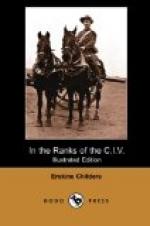June 29.—“Stables” and harness-cleaning all the morning. In the afternoon we were sent to graze our horses outside the town with a warning to look out for sniping. As I write I am sitting under a rock, the reins secured to one of my legs, which accounts for bad writing. Lindley is below, a mere little village with a few stores, which nevertheless was for a proud week the capital of the Free State. For some time past it has been closely besieged by the Boers, and entirely dependent on one or two armed convoys like ours. The Boers have been shelling the town most days, and fighting goes on outside nearly every day. The day before we relieved it the Boers made an effort to take it, and our Infantry lost heavily. There was a garrison of about a thousand, I think, before we came. There is nothing eatable to be bought at any price, and no communication with the outside world, except by despatch-riders. I was talking yesterday to two Yeomanry fellows who had escaped from one of the Boer commandos. They had lived entirely on fresh meat, and were devouring dog-biscuit by our cook’s fire like famished terriers. They said they had been well treated.
June 30.—Not much rest was allowed us. Reveille was at 4 A.M., with orders for our section, under Lieutenant Bailey, to march half-way to Kroonstadt again, as part of an escort for a return convoy carrying sick and wounded.
Started at five with Yeomanry, Bushmen, and Buffs, as before, but were delayed two hours outside town, waiting for some traction-engines, which puffed asthmatically at the bottom of a drift, unable to get up. Marched rapidly for sixteen miles (most of the country burnt by veldt fires), over the same difficult road, and (for a luxury) encamped while it was still light. Washed in a river with great zest. Fresh mutton for supper. Turned in with orders for reveille at 4 A.M. But at 11.30 P.M. we were all awakened by “Come on, get up and harness up.” “Why, what’s the time?” “11.30.” However, up we got, not knowing why, tossed on harness, and started straight away back for Lindley, supposing they were being attacked. It was a hard march over those detestable drifts, in pitch dark and freezing cold, with one halt only of ten minutes. The centre driver has a trying time in bad places of the road, for at steep bits on the down grade, if the wheelers get at all out of control, he has the pole bearing down on him, either punching his horses and making them kick, or probing for vulnerable places in his own person. He has the responsibility of keeping his traces just so that they are not slack, and yet that the horses are not in draught and pulling the gun or waggon down. The lead-driver has to pick the road and, with one eye on the gun just ahead, to judge a pace which will suit the wheel-driver, who at such moments must have a fairly free hand. All three live always in a fierce glare of criticism from the gunners riding behind, who in their nasty moments are apt to draw abusive comparisons between the relative dangers of shell-fire and riding on a waggon. By the way, there is always a healthy antagonism between gunners and drivers. When one class speaks of the other there is generally an adjective prefixed.




